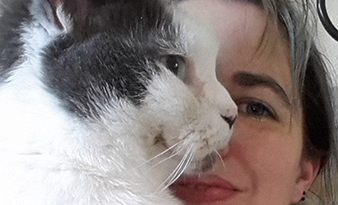Gayle Hallowell talks about her passion for medicine and sick animals and the interesting career path this took her to.
From the early age of 5, I always wanted to be a vet and never wavered. I pestered my parents for riding lessons, which they gave into on my 5th birthday and I spent much of my spare time from then on working with horses. I grew up with a very grumpy cat called Cleo during the first 11 years of my life – I never understood her and that lack of understanding of cats has continued! In my early to late teenage years, I had a fascination with exotic animals and collected a menagerie before going to vet school, which included a parrot (who still lives with my parents), rabbits, guinea pigs, a chinchilla and a tortoise.
I studied at Cambridge Veterinary School and went to vet school wanting to be a zoo vet. During my school years and whilst at vet school, I spent a lot of time working with John Newcombe, a horse reproduction vet. He exuded love for his job (after what I perceived was after a VERY long time being a vet) and I wanted the same in my career. About halfway through my course, I realised I wanted to be really good at one thing and at that time zoo medicine was in its infancy. I didn’t love working with cats and pigs so decided a career with horses was what I wanted to pursue. In my clinical years at Cambridge, I had the opportunity to teach and realised that this was something I also wanted to incorporate into my future career.
My first job was as a ‘horse’ junior doctor at the Royal Veterinary College, London. There was very much a work hard-play hard mentality and I actually couldn’t believe that they paid me when I took into account the amount I learned and how much fun I had. I really got the bug for anaesthetising patients and looking after sick horses. I was lucky enough to go and spend 4 weeks at the veterinary school at the University of Cornell to learn to anaesthetise animals other than horses, particularly farm animals and also see some other medicine cases. I quickly realised that as much as I loved anaesthesia and how drugs worked, I didn’t want to spend very much time working with cats! I did however quickly learn that surgery and lameness in horses were not ‘my thing’, but did very much like working with farm animals. So the next step after a period of anaesthesia in all species so I could complete my certificate in anaesthesia, was a residency (like a registrar position in human medicine) in large animal (farm animals and horses) in medicine and emergency and critical care so I could specialise in these areas.
During this three-year training position, I continued to love looking after horses that were sick due to problems with their intestinal tract, but also developed a love for diseases of the horse’s heart and using ultrasound for diagnosing disease. At the end of the period I became an American Specialist in Large Animal Internal medicine – an American qualification because that was where my supervisor had trained and had established training programmes and qualification.
I then very sadly left the Royal Veterinary College to move to the brand-new vet school at the University of Nottingham, to undertake a PhD looking at the aortic heart valve in horses, with one of my residency supervisors. During my PhD, I completed my second specialist qualification in Emergency and Critical Care and became an American Specialist of American College Veterinary Emergency and Critical Care. My love for teaching had continued during the years I had been at the Royal Veterinary College and at that time, in order to have a career working in a University teaching veterinary students, a PhD was essential. I found time away from clinical work very hard, but I learned lots of skills that have stood me in good stead. During my PhD, my supervisor and I examined and ultrasounded 1000 horses hearts!
After my PhD, I got a ‘proper’ job working as an academic at the University of Nottingham and am currently Professor in Veterinary Internal Medicine and Critical Care. I am very fortunate that I still spend 60% of my time being a vet and treating animals whilst also educating final year students. As well as that I get to teach students in the earlier years of the veterinary course and hopefully be a role model and have some role in what and how we teach. After nearly 20 years, I still love my job, no day is ever the same and most days are school days-once I stop learning, I will retire.
Once you are a Specialist, it is not all about seeing cases, but also giving back and contributing to other areas of the profession. I have been an external examiner for vet schools, had several roles with ACVIM, been on postgraduate examination committees including ACVECC, was involved on the committee setting up the ‘new’ RCVS Fellowship and still undertake research, publish papers and give talks that will help to answer clinical questions. My research work is currently focussed around diseases of the stomach and heart in horses. I am currently President of the British College of Veterinary Specialists. One of the most important roles of the specialist is to contribute to training of the next generation of specialists and to pass on the knowledge you have accrued as people have done and still do to me… It is a busy, rewarding and challenging career and certainly never dull….writing an undergraduate teaching module today, attending a meeting about guidelines for successful resuscitation in sick animals tonight, seeing some bulls yesterday and horse medicine cases tomorrow. Who knows what next week will bring!
Find Gayle’s profile here

